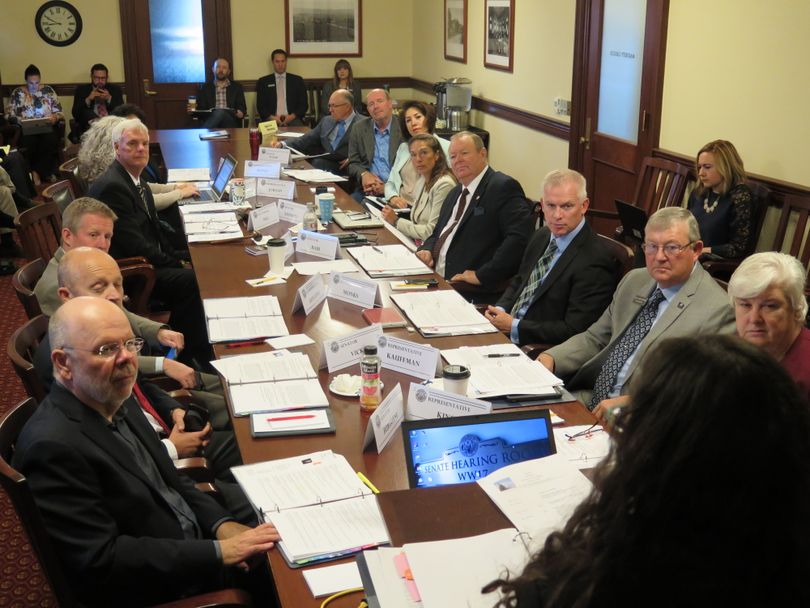Lawmakers ponder options for end of session, after state Supreme Court decision this year…

Idaho lawmakers are struggling with how to change the way they do business at the end of the legislative session, in light of this year’s Idaho Supreme Court ruling upholding the governor’s veto of a grocery tax bill, while overturning a nearly 40-year-old court precedent and holding that the Legislature must get all bills to the governor before it adjourns – not wait until afterward.
“The court’s ruling is that the Legislature has to present its bills to the governor before you (adjourn) sine die,” Legislative Services Director Eric Milstead told the Legislature Council this morning. “So that’s inviolate at this point – that’s the law. That’s what the Legislature has to do.”
Top legislative leaders and staffers, in coordination with the Attorney General’s office, have been working to draft a proposed new joint rule to ensure that happens. So far, Senate President Pro Tem Brent Hill said, the idea is simply to present a draft rule to lawmakers when this year’s session opens, not to adopt it. Then, as the session goes, lawmakers can discuss and revise it.
The draft presented to the Legislative Council this morning calls for the Legislature to wait before it adjourns sine die – which is Latin for without a day, and means they’re done for the year – for a brief “administrative session,” in which all bills can be transmitted to the governor and a report can be received back confirming that. That administrative session could be a half-day or up to five days; it would have no set time, but would just allow the already passed bills to be processed. During the administrative session, for the most part no other legislative business could be conducted – no votes, bill introductions, etc.
But that idea raised questions among members of the Legislative Council, the group that handles legislative matters between sessions. Senate Minority Leader Michelle Stennett, D-Ketchum, questioned whether the Legislature could vote on a veto override during that administrative session; Hill and Milstead said yes.
“It doesn’t modify the veto process in any way,” Hill said. And the Legislature would not yet have officially adjourned for the year.
Rep. Phylis King, D-Boise, said, “So it sounds to me like we’re going to be sitting around and we’re going to be being paid for the time that the bills are being transmitted, is that correct?” Hill responded, “That’s correct. … That’s one of the consequences that we ended up with here.”
Sen. Grant Burgoyne, D-Boise, said he had both legal and practical questions about the approach. Rather than “sitting around doing nothing getting paid,” he said, “It seems that we ought to use that time productively.” He suggested possibly moving agency rules review to that time period, but other lawmakers opposed that idea. “We could pass resolutions at the end of the session that don’t need any gubernatorial action … and make good use of our time,” Burgoyne suggested.
Sen. Steve Vick, R-Dalton Gardens, said, “My thoughts are along those same lines. I wondered if there was discussion about, if there was a way to adjourn for a longer period of time, so that we could go home, and not have to pay us.”
Vick has twice introduced proposed constitutional amendments to let the Legislature come back to town after adjournment specifically to override vetoes; the Idaho Legislature currently doesn’t have that option, as only the governor can call a special session once lawmakers have adjourned. “I think it’s a function that we should have the ability to do,” Vick said. He suggested it could be incorporated into this rule change – so the Legislature could adjourn for a longer period of time and then return, without having to keep paying legislators for the days between.
The governor has five days to sign or veto a bill once it’s presented to him, or it becomes law without his signature; he has 10 days if the Legislature has adjourned for the year.
Milstead said, “I think it is difficult to stop the session, not be responsible for per diem, and then start it back up. I’m not sure how that would work. But I think it’s something we could look into.”
Hill agreed. “We’d have to work with the compensation committee and so forth, but I think it’s something we could look into,” he said.
“The court case didn’t address the veto process,” he noted. “Our concern here is to address the court’s ruling. All it says is that we have to have our bills there before we sine die. … What we’re trying to address here is just that narrow part of having the bills transmitted before we sine die.”
For the coming year, Hill and House Speaker Scott Bedke are proposing a calendar that reflects a target for completing the session’s business by March 23, a Friday, then adjourning sine die the following Tuesday.
